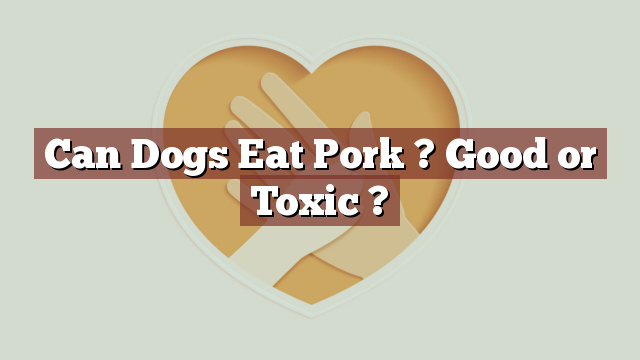Can Dogs Eat Pork? Good or Toxic?
It is essential for pet owners to be aware of what foods are safe for their furry friends to consume. While dogs are often viewed as omnivores, it is crucial to understand their dietary needs and restrictions. One common question that arises is whether dogs can safely consume pork. In this article, we will explore the nutritional value of pork for dogs, discuss its safety or toxicity, potential risks and benefits, and provide guidance on what to do if your dog eats pork.
Nutritional Value of Pork for Dogs
Pork is a rich source of protein, vitamins, and minerals. It contains essential amino acids that are necessary for the growth and maintenance of a dog’s muscles. Pork also provides various B vitamins, including thiamine, riboflavin, niacin, and vitamin B12, which play a vital role in maintaining a dog’s overall health. Additionally, pork contains minerals such as iron, zinc, and selenium, which are essential for proper bodily function.
Is Pork Safe or Toxic for Dogs?
Yes, dogs can safely consume pork as part of a balanced diet. However, certain precautions need to be taken. It is crucial to ensure that the pork is thoroughly cooked, as raw or undercooked pork can contain harmful bacteria like salmonella or trichinella. These bacteria can cause serious health issues in dogs. Furthermore, fatty cuts of pork can lead to pancreatitis in dogs, so it is advisable to remove excess fat before feeding it to your pet.
It is worth noting that while pork itself is safe for dogs, other forms such as cured or processed pork products like bacon or ham should be avoided. These products often contain high levels of salt, preservatives, and seasonings that can be harmful to dogs.
Potential Risks and Benefits of Dogs Eating Pork
As with any food, there are both risks and benefits associated with dogs consuming pork. One risk is the potential for dogs to develop pancreatitis due to the high-fat content in certain cuts of pork. Pancreatitis is a condition that causes inflammation of the pancreas and can be life-threatening if not promptly treated.
On the other hand, pork can provide several health benefits for dogs. The protein found in pork supports the development and maintenance of healthy muscles. The B vitamins present in pork contribute to a healthy metabolism, nervous system, and overall well-being. Additionally, pork can be a valuable source of iron for dogs, aiding in the production of red blood cells and preventing anemia.
What to Do If Your Dog Eats Pork
If your dog accidentally consumes pork, there are a few steps you can take depending on the circumstances. If the pork was raw or undercooked, monitor your dog for any signs of illness such as vomiting, diarrhea, or lethargy. In such cases, it is advisable to contact your veterinarian immediately.
If the pork was cooked and your dog has no adverse reactions, there is usually no cause for concern. However, it is essential to feed pork in moderation and avoid fatty cuts. Always consult with your veterinarian regarding your dog’s specific dietary needs and any concerns you may have.
Conclusion: Can Dogs Eat Pork?
In conclusion, dogs can safely eat pork as long as it is properly cooked, served in moderation, and free from added seasonings or excessive fat. Pork can provide valuable nutrients such as protein, B vitamins, and minerals, contributing to a balanced diet for your furry friend. However, it is crucial to avoid cured or processed pork products, as they may contain harmful additives. As a responsible pet owner, it is essential to be mindful of your dog’s individual needs and consult with a veterinarian for specific dietary guidance.
Thank you for investing your time in exploring [page_title] on Can-Eat.org. Our goal is to provide readers like you with thorough and reliable information about various dietary topics. Each article, including [page_title], stems from diligent research and a passion for understanding the nuances of our food choices. We believe that knowledge is a vital step towards making informed and healthy decisions. However, while "[page_title]" sheds light on its specific topic, it's crucial to remember that everyone's body reacts differently to foods and dietary changes. What might be beneficial for one person could have different effects on another. Before you consider integrating suggestions or insights from "[page_title]" into your diet, it's always wise to consult with a nutritionist or healthcare professional. Their specialized knowledge ensures that you're making choices best suited to your individual health needs. As you navigate [page_title], be mindful of potential allergies, intolerances, or unique dietary requirements you may have. No singular article can capture the vast diversity of human health, and individualized guidance is invaluable. The content provided in [page_title] serves as a general guide. It is not, by any means, a substitute for personalized medical or nutritional advice. Your health should always be the top priority, and professional guidance is the best path forward. In your journey towards a balanced and nutritious lifestyle, we hope that [page_title] serves as a helpful stepping stone. Remember, informed decisions lead to healthier outcomes. Thank you for trusting Can-Eat.org. Continue exploring, learning, and prioritizing your health. Cheers to a well-informed and healthier future!

